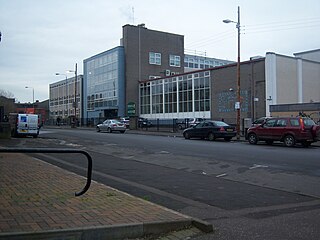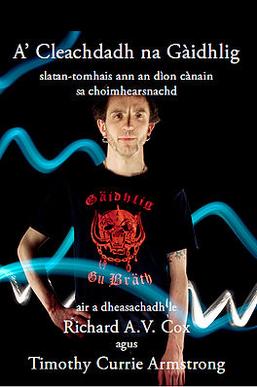Related Research Articles

Scottish Gaelic, also known as Scots Gaelic or simply Gaelic, is a Goidelic language native to the Gaels of Scotland. As a Goidelic language, Scottish Gaelic, as well as both Irish and Manx, developed out of Old Irish. It became a distinct spoken language sometime in the 13th century in the Middle Irish period, although a common literary language was shared by the Gaels of both Ireland and Scotland until well into the 17th century. Most of modern Scotland was once Gaelic-speaking, as evidenced especially by Gaelic-language place names.

Canadian Gaelic or Cape Breton Gaelic, often known in Canadian English simply as Gaelic, is a collective term for the dialects of Scottish Gaelic spoken in Atlantic Canada.

Edward Dwelly (1864–1939) was an English lexicographer and genealogist. He created the authoritative dictionary of Scottish Gaelic, and his work has had an influence on Irish Gaelic lexicography. He also practised as a professional genealogist and published transcripts of many original documents relating to Somerset.

Mill a h-Uile Rud is a Seattle-based band who sing in Scottish Gaelic.
In the early 1980s in Scotland, Ceartas was a protest group which attempted to publicise the unequal treatment of the Gaelic language.

The Gaelic Language (Scotland) Act 2005 is an Act of the Scottish Parliament passed in 2005. It was the first piece of legislation dedicated to the Scottish Gaelic language and was seen as the first hesitant step by the Scottish Executive to provide a legislative framework for the use of Gaelic by Scottish Public sector authorities. It created a Gaelic Language Board, but created no general rights of citizens or obligations on statutory authorities to actually use the language. This is in contrast to the UK parliament's legislation for the Welsh Language which authorises the use of Welsh in public administration. There has been no significant development of the Gaelic Language (Scotland) Act 2005 between 2005 and 2021.

Clì Gàidhlig, founded in 1984 as Comann an Luchd-Ionnsachaidh, is an organisation based in Inverness which seeks to support learners of the Scottish Gaelic language and has campaigned actively to promote the language.

BBC Alba is a Scottish Gaelic-language free-to-air public broadcast television channel jointly owned by the BBC and MG Alba. The channel was launched on 19 September 2008 and is on-air for up to seven hours a day. The name Alba is the Scottish Gaelic name for Scotland. The station is unique in that it is the first channel to be delivered under a BBC licence by a partnership and was also the first multi-genre channel to come entirely from Scotland with almost all of its programmes made in Scotland.
Dè a-nis? was a Scottish Gaelic-language children's programme produced by BBC Gàidhlig. It was broadcast on BBC Alba on Wednesday nights at 6:00pm. "Dè a-nis" is Gaelic for "What Now?"

Scottish Gaelic-medium education, also known as Gaelic-medium education (GME), is a form of education in Scotland that allows pupils to be taught primarily through the medium of Scottish Gaelic, with English being taught as the secondary language.

Ùr-sgeul was an independent publisher of new Scottish Gaelic prose. The name Ùr-sgeul is a Gaelic word which translates variously as: a romance, a novel or a recent tale. Professor Alan Riach, in Scottish Literature: An introduction, summarises the Ùr-Sgeul publishing initiative as "devoted to prose fiction and developing an increasingly impressive list of new titles: short stories and anthologies but mainly single-author novels."

Joy Dunlop is a Scottish broadcaster, singer, step dancer and educator from the village of Connel in Argyll, who now lives in Glasgow, Scotland. Singing predominantly in Scottish Gaelic, she performs folk music, song and dance in a contemporary style rooted in the tradition. She is a weather presenter for BBC Scotland and BBC ALBA and formerly a volunteer radio presenter with Oban FM

Alba is the Scottish Gaelic name for Scotland. It is also, in English-language historiography, used to refer to the polity of Picts and Scots united in the ninth century as the Kingdom of Alba, until it developed into the Kingdom of Scotland of the late Middle Ages following the absorption of Strathclyde and English-speaking Lothian in the 12th century. It is cognate with the Irish term Alba and the Manx term Nalbin, the two other Goidelic Insular Celtic languages, as well as contemporary words used in Cornish and Welsh, both of which are Brythonic Insular Celtic languages. The third surviving Brythonic language, Breton, instead uses Bro-Skos, meaning 'country of the Scots'. In the past, these terms were names for Great Britain as a whole, related to the Brythonic name Albion.
Mid-Minch Gaelic is a currently developing pan-regional form of Scottish Gaelic, loosely based on the surviving dialects of Scottish Gaelic with considerable numbers of speakers. It has also been referred to by a number of other names, such as Standard Hebridean, BBC Gaelic, Standard Gaelic or Mixed Gaelic.

A' Cleachdadh na Gàidhlig: slatan-tomhais ann an dìon cànain sa choimhearsnachd is an anthology of essays edited by Richard A.V. Cox and Timothy Currie Armstrong addressing the current state of the Gaelic language and assessing efforts to effect language revitalization in Gaelic-speaking communities in Scotland. Published in 2011, the book was ground-breaking on several counts. It was the first book of its kind to address sociolinguistic and language planning issues surrounding the Gaelic-language revival predominantly written in the Gaelic language itself. It is also noteworthy and unusual for its breadth of analysis, drawing together academic research articles, articles by policy makers, and articles from activists and language development professionals reporting on specific Gaelic revitalization projects. Four of the articles address the Welsh language revival and make useful comparisons between initiatives in Wales and the revival in Scotland.
Mary MacPherson (née MacDonald), known as Màiri Mhòr nan Òran or simply Màiri Mhòr, was a Scottish Gaelic poet from the Isle of Skye, whose contribution to Scottish Gaelic literature is focused heavily upon the Highland Clearances and the Crofters War; the Highland Land League's campaigns of rent strikes and other forms of direct action. Although she could read her own work when it was written down, she could not write it down herself. She retained her songs and poems in her memory and eventually dictated them to others, who wrote them down for publication. She often referred to herself as Màiri Nighean Iain Bhàin, the name by which she would have been known in the Skye of her childhood.

Marcas Mac an Tuairneir is an English writer and singer. He writes and publishes in Scottish Gaelic, English and Polari.
Gath is the name of a Scottish Gaelic language magazine that was published by Gath Earranta. The first edition was published in August 2003, intending to replace the older Gairm magazine, which had closed. Gath aimed to reproduce the mainstream appeal of its predecessor, whilst attracting a younger audience with fresh topics, such as contemporary music and current events. Each issue contained a number of short stories, essays, and poems; over 500 short stories were published in the magazine. Bòrd na Gàidhlig provided a £5000 foundational grant and ongoing support, and Gath was published biannually from 2003 until at least 2008. The reception was generally positive. Writers who published in the magazine include some of the most respected Gaelic writers, such as Christopher Whyte, Aonghas Phàdraig Caimbeul, Maoilios Caimbeul, Meg Bateman, Aonghas Dubh MacNeacail, Iain Moireach, Alison Lang, Moray Watson, Rob Shirley, Fionnlagh MacLeoid, Gregor Addison and Eilidh Rosach. The editors were Dòmhnall E. Meek, Jo NicDhomhnaill, and Richard Cox.

Dàin do Eimhir is a sequence of sixty poems written in Scottish Gaelic by Sorley MacLean. Considered MacLean's masterpiece, the poems deal with intertwining themes of romantic love, landscape, history, and the Spanish Civil War, and are among the most important works ever written in Scottish Gaelic literature.
References
- ↑ "Iris ùr Ghàidhlig ri fhaotainn air-loidhne". Naidheachdan A' BHBC (in Scottish Gaelic). 10 March 2014.
- ↑ "Mar dhèidhinn". danamag.org. Retrieved 27 January 2017.
- ↑ "dhachaigh". danamag.org. Archived from the original on 13 March 2014. Retrieved 16 January 2022.
- ↑ Rhona NicDhùghaill. "Dubhlan Shanjeev BBC Alba". Dàna Magazine. Retrieved 27 January 2017.